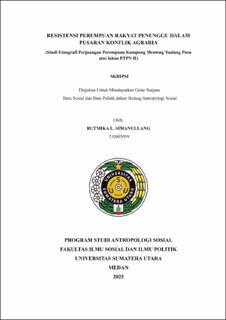| dc.description.abstract | The role of women in agrarian conflicts is frequently marginalized in dominant discourse, despite their crucial involvement in defending land rights. This study investigates the resistance strategies of Rakyat Penunggu women within the ongoing cycle of agrarian conflict in Menteng Tualang Pusu Village. The research
primarily seeks to explore how these women organize resistance against the state owned enterprise PTPN II, which holds the land use title (HGU), and to trace the narratives of their struggle from the early stages of the conflict. Using a qualitative
approach and ethnographic methods, data were collected through in-depth interviews and participatory observation. The analysis employed ongoing analytical techniques and fieldnotes to identify and interpret key emerging issues.
The findings, based on two months of fieldwork along with several return visits, reveal that the women of Menteng Tualang Pusu engage in both individual and collective forms of resistance against PTPN II. On an individual level, resistance takes the form of cultivating land and building homes on contested territory.
Collectively, their resistance is manifested through demonstrations, religious activities, partnerships with PEREMPUAN AMAN, digital advocacy, economic initiatives, and educational efforts. Demonstrations act as a direct and visible assertion of agrarian rights. Religious gatherings (perwiridan) serve as emotional
and mental support networks. The women also collaborate with PEREMPUAN AMAN for advocacy and capacity-building. Digital media is strategically used to amplify their voices and spread awareness. Economically, the collective farming
(kebun kolektif) provides sustenance for daily needs while affirming the presence and agency of the women’s community. Additionally, the customary school (sekolah adat) functions as a space for transmitting traditional knowledge and values to younger generations.
This study concludes that women's resistance in the context of agrarian conflict in Menteng Tualang Pusu is diverse, shaped by variations in life experiences, levels of organizational involvement, and the strategic choices they make in the face of external pressures. Each form of resistance reflects the evolving and dynamic nature of the ongoing conflict. | en_US |


